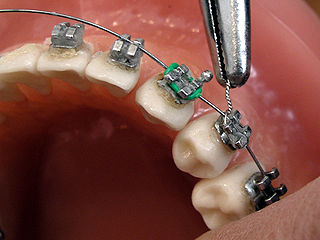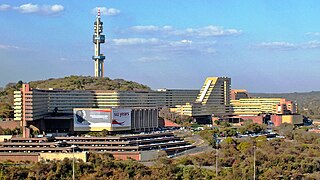Software engineering is a systematic engineering approach to software development.

Orthodontics is a dentistry specialty that addresses the diagnosis, prevention, management, and correction of mal-positioned teeth and jaws, and misaligned bite patterns. It may also address the modification of facial growth, known as dentofacial orthopedics.
ETC or etc may also refer to:
A specialist registrar (SpR) is a doctor in the United Kingdom or the Republic of Ireland who is receiving advanced training in a specialist field of medicine in order to become a consultant in that specialty.

Cherpulassery is a town and municipality in the Palakkad district, of Kerala, India. Cherpulassery is often called the Sabarimala of Malabar as the famous Ayyappankavu temple is located here. The Puthanalakkal Bhagavathi temple and the Kalavela and Pooram associated with it is one of the largest festivals in the region. The town is located about 43 km (27 mi) west of the district headquarters at Palakkad on State Highway 53. Cherpulassery is known among the football enthusiasts all across the state thanks to the football team AL Madeena,Cherpulassery.

A smart meter is an electronic device that records information such as consumption of electric energy, voltage levels, current, and power factor. Smart meters communicate the information to the consumer for greater clarity of consumption behavior, and electricity suppliers for system monitoring and customer billing. Smart meters typically record energy near real-time, and report regularly, short intervals throughout the day. Smart meters enable two-way communication between the meter and the central system. Such an advanced metering infrastructure (AMI) differs from automatic meter reading (AMR) in that it enables two-way communication between the meter and the supplier. Communications from the meter to the network may be wireless, or via fixed wired connections such as power line carrier (PLC). Wireless communication options in common use include cellular communications, Wi-Fi, wireless ad hoc networks over Wi-Fi, wireless mesh networks, low power long-range wireless (LoRa), Wize Zigbee, and Wi-SUN.

Chandra Kumar Naranbhai Patel (born 2 July 1938) is an electrical engineer. He developed the carbon dioxide laser in 1963; it is now widely used in industry for cutting and engraving a wide range of materials like plastic and wood. Because the atmosphere is quite transparent to infrared light, CO2 lasers are also used for military rangefinding using LIDAR techniques.

The University of South Africa (UNISA), known colloquially as Unisa, is the largest university system in South Africa by enrollment. It attracts a third of all higher education students in South Africa. Through various colleges and affiliates, UNISA has over 400,000 students, including international students from 130 countries worldwide, making it one of the world's mega universities and the only such university in Africa.
Susan Hackwood is the executive director of the California Council on Science and Technology (CCST). She is a professor and researcher of electrical engineering credited for inventing the concept of electrowetting with Gerardo Beni in 1981.
The California Council on Science and Technology (CCST) is an independent, not-for-profit 501(c)(3) organization designed to offer expert advice to the California state government and to recommend solutions to science and technology-related policy issues. CCST is modeled after the National Academies - the official scholarly body serving the United States of America - to provide the State of California with a parallel network of institutional and individual advisors.
Charles F. Kennel is an American plasma physicist and former Associate Administrator of NASA. He is an elected member of the National Academy of Sciences and won the James Clerk Maxwell Prize for Plasma Physics in 1997. In 2009, he was advertised by NASA Watch as a potential pick by Barack Obama as the next NASA Administrator.
National Board of Diving and Hyperbaric Medical Technology (NBDHMT), formally known as the National Association of Diving Technicians, is a non-profit organization devoted to the education and certification of qualified personnel in the fields of diving and hyperbaric medicine.
The Cape Academy of Mathematics, Science and Technology, often abbreviated to "Cape Academy", is a co-educational public boarding school, situated in the Constantia Valley of Cape Town, South Africa. The Cape Academy was founded in 2004 by the Western Cape Education Department to offer quality instruction in the sciences to students from previously disadvantaged backgrounds, as part of the government's strategy to fill the skills gap present in South Africa.

Comboni College for Science and Technology (CCST), originally Comboni College for Computer Science, is a private college in Khartoum, Sudan, established as a technical college since 2001. It goes back to the earlier school for boys, founded by Catholic priests from Italy in 1929.

Katherine "Kathy" Anne Yelick is an American computer scientist, a professor of Electrical Engineering and Computer Sciences at the University of California, Berkeley, and the Associate Laboratory Director for Computing Sciences at Lawrence Berkeley National Laboratory.
Maxine Savitz is the vice president of the National Academy of Engineering, and holds a Ph. D in organic chemistry. She has more than 30 years of experience as a manager for research, development and implementation programs in both the public and private sectors. She had been a member of the President's Council of Advisors on Science and Technology (PCAST) from 2009 to 2016.
This page is based on this
Wikipedia article Text is available under the
CC BY-SA 4.0 license; additional terms may apply.
Images, videos and audio are available under their respective licenses.






